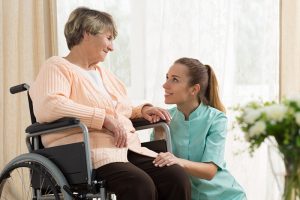
Managing chronic obstructive pulmonary disease is made easier with help from a trusted caregiver.
COPD, or chronic obstructive pulmonary disease, pertains to two lung diseases: emphysema and chronic bronchitis. Basically, patients’ breathing is severely affected by an obstruction to airflow. Frequent symptoms include an excessively wet cough, wheezing, shortness of breath, and tightness in the chest.
By the year 2030, the World Bank and World Health Organization is estimating that COPD will be the 3rd leading cause of death internationally. COPD as an economic problem is a major cause of disability-induced unemployment.
You, as a family caregiver, are on the front line of reducing this burden. While there is no cure, COPD is treatable, and your caregiving is necessary to an effective rehabilitation program. Diet, exercise, and environmental maintenance are all areas in which you can substantially help with managing chronic obstructive pulmonary disease.
Diet
A balanced diet provides someone with COPD with the extra calories and energy necessary to overcome chest infections and to manage their more laborious breathing. Planning and preparing meals and otherwise informing your loved one regarding which foods to include are valuable ways you can help.
Tiredness often stops COPD patients from consuming enough calories. Beginning the day with a larger, more nutrient-dense meal when the individual you love has the most energy to eat can be helpful. Following that with smaller meals throughout the day will not only help maintain calories, but also prevent the person from feeling too full, which can cause it to be tougher to breathe.
Though a morning coffee may once have been essential, unfortunately caffeine can react negatively to COPD medications and cause restlessness or nervousness, leading to exacerbated symptoms. In the same way, help the senior stay away from foods high in salt, as water retention caused by salt also makes for tougher breathing.
Exercise
Regular physical exercise is fundamental for effective COPD symptom management. In general, it enhances endurance and improves blood circulation, making for improved use of oxygen. Upper body exercises help with breathing and the ability to complete daily activities. Lower body exercises like stair climbing and track or treadmill walking have also been shown to benefit people with COPD.
Breathing exercises, including pursed lip breathing and diaphragmatic breathing, produce stronger breathing muscles, increased oxygen, and overall easier breathing. A good plan incorporates sessions of five to ten minutes, three to four times a day.
Environmental Maintenance
Finally, you should also give consideration to environmental issues in the individual’s home, specifically as related to air quality. A good place to get started is to keep the senior’s home appropriately ventilated through open windows, exhaust fans, and filtration systems. However, windows should be kept shut during poor air quality days and dusty conditions, such as construction projects. Also, maintaining a balanced humidity level prevents dry air from home heating systems and deters irritating pests attracted to more humid conditions.
Avoiding or managing very cold air, cigarette and fireplace smoke, and other air pollutants are ways you can best serve a loved one with COPD, as does limiting the use of personal care products including hair sprays, perfumes, and lotions.
Keeping the home clean can go a long way towards minimizing irritants in the house. Eliminate and properly store dust-collecting clutter. Weekly washing of bed lines minimizes dust mites, as does keeping carpets vacuumed and floors clean. At the same time, reducing exposure to harsh household cleaning products and other chemicals, like air fresheners, is essential.
Find more tips on helping a person with chronic obstructive pulmonary disease live the healthiest possible life and how our in-home caregivers can partner with you to ensure quality, seamless care. Call us any time at 800.791.7785 to learn more about the difference our caregivers make with elder care in Burlington and the surrounding areas.

